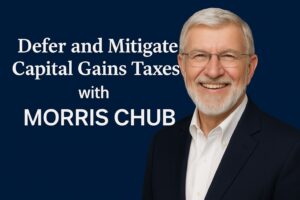I have had the good fortune to work with many clients who purchase real estate investment property as a strategic part of their overall financial plans. As both a licensed investment professional and experienced real estate broker, I believe owning income-producing real estate is an excellent strategy for clients seeking broader portfolio diversification beyond just stocks and bonds and alternative sources of income potential.
Surprisingly, however, when introduced to the concept of the 1031 exchange as a tax efficient approach to selling and purchasing investment property, many eschew this approach, believing it is too complicated or only designed for big corporate investors. Neither view is entirely accurate.
Too Complex?
Internal Revenue Code Section 1031 enables investment property owners to sell investment property and defer paying taxes if the proceeds from the sale are reinvested in a like-kind replacement property of equal or greater value within certain timelines. If you were a first-time investor and just read that sentence, several questions might immediately come to mind:
- What is a like-kind property?
- What are the timelines?
- What taxes are deferred?
- What constitutes investment property?
Subsequently, without you knowing the answers to these questions, you might simply assume the 1031 exchange is too complicated for you. But it need not be. While the rules governing 1031 exchanges are well-defined and must be strictly adhered to, a good Qualified Intermediary (QI) can help guide you so that your exchange goes smoothly. The QI plays a vital role in the exchange process and works closely with your tax and legal advisors and your investment professional to help ensure all the boxes are getting checked off properly and in accordance with the rules.
Not for Me?
Are 1031 exchanges only used by big wealthy investors, corporations, or partnerships? In a word, no. The generous tax advantages of the IRC Section 1031 code apply to anyone owning investment property that has a gain or appreciated value (market value greater than its adjusted basis). That means large institutional investors who own and sell commercial office buildings or retail centers, as well as small mom and pop’s who own a single rental property, are enjoying the benefits of 1031 exchanges.
And according to a recent commentary in Realtor Magazine by Shannon McGahn, National Association of Realtors SVP of government affairs:
“Only 5% of exchanged properties are held by corporations, with the majority owned by mom-and-pop investors.1”
Further evidence confirming the popularity of 1031 exchanges among individual investors is the fact that use of the Delaware Statutory Trust (DST) structure, which conforms to 1031 exchange rules, continues to grow in volume every year. 2
One reason for that growth can be attributed to the fact that a DST is a passive investment structure, and many investors who have tired of the daily maintenance and management hassles of ownership, are flocking to DSTs, which have already purchased properties and have management teams in place who are responsible for those duties.
According to recent data from Mountain Dell Consulting, this securitized part of the 1031 exchange industry (of which DST’s represent 93% of the volume) raised nearly $3.5 billion in 2019, the second highest yearly volume on record.2 That is a strong indicator that the 1031 exchange business is healthy, demand is growing, and that these tax-advantaged structures are not just for the big guys!
We trust this discussion has been helpful, and we encourage you to find additional insights in our eBook, Top 11 Misconceptions About 1031 Exchanges, which you can download for free HERE.
2 https://thediwire.com/1031-exchange-programs-raise-3-5-billion-in-2019/
This is for informational purposes only, does not constitute as individual investment advice, and should not be relied upon as tax or legal advice. Please consult the appropriate professional regarding your individual circumstance. Because investors’ situations and objectives vary this information is not intended to indicate suitability for any particular investor.
DST 1031 properties are only available to accredited investors (typically have a $1 million net worth excluding primary residence or $200,000 income individually/$300,000 jointly of the last three years) and accredited entities only. If you are unsure if you are an accredited investor and/or an accredited entity please verify with your CPA and Attorney.
There are material risks associated with investing in DST properties and real estate securities including liquidity, tenant vacancies, general market conditions and competition, lack of operating history, interest rate risks, the risk of new supply coming to market and softening rental rates, general risks of owning/operating commercial and multifamily properties, short term leases associated with multi-family properties, financing risks, potential adverse tax consequences, general economic risks, development risks, long hold periods, and potential loss of the entire investment principal.
Potential cash flows/returns/appreciation are not guaranteed and could be lower than anticipated. Diversification does not guarantee a profit or protect against a loss in a declining market. It is a method used to help manage investment risk.
Securities offered through Concorde Investment Services, Inc. (CIS), member FINRA/SIPC. Insurance offered through Concorde Insurance Agency, Inc. (CIA) Halston Pacific is independent of CIS and CIA.



